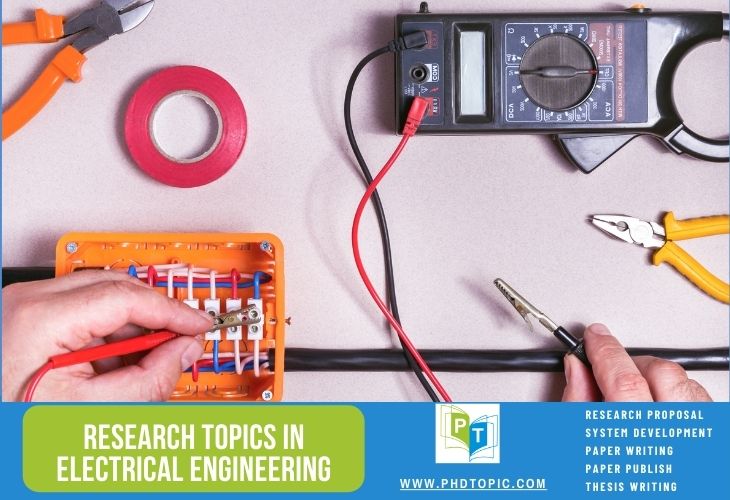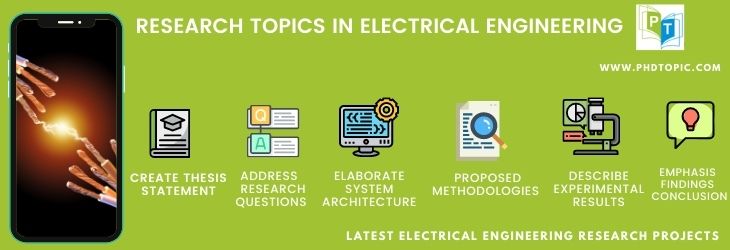Electrical engineering is the branch of engineering which handles the designing, maintenance, and control of power electronic & power system devices. As well as they apply the electricity/power in that devices. Electrical engineering is often called EEE. They consider the effective power supplies of electrical devices and perform testing tasks to ensure electrical protection.
“This article is dedicated to the enthusiasts who are dynamically surfing for the research topics in electrical engineering”
By using the power electronics techniques electrical engineering offers consistent power systems. This is also aimed at optics, electrical mechanisms, and physics so on. This article is completely focused on giving the exact details on the research topics in electrical engineering to the students. At the end of this article, you would find the indispensable specifics and you will enjoy this article to be sure.
This article is going to beat your expectations as this is treasured with interesting facts. In addition, we wanted to begin this article with our familiar skillsets for your valuable considerations. Our technical team is framed with world-class engineers who can handle the entire aspects of technology. Now let’s begin this article with our experts’ skills in EEE.

Our Experts Skills in EEE
- Perform Various Electronic Devices Preservation & Handling
- Processed with Multiple Data Acquisition & Investigation
- Worked in various Electrical Schematics Environments
- Understanding of Linear Algebra Theories & Analytics
- Able to design new and customize Electrical Circuit Design/Models
The above mentioned are some of the skillsets of our technical team. Apart from this, our technical crew is well versed in the other areas of electrical engineering technology too. To be honest, we are providing every practical explanation with graphical illustrations which results in the students’ great compassion. We are being trusted by students from all over the world. Envisaging the innovations and applying them to the technologies are our major objectives and we are successfully yielding the same in every approach to research topics in electrical engineering.
In the following passage, we can move on to the core aspects of the article’s theme. Guys don’t squeeze your heads about the next section. We are mounting to the significant electrical components of electrical engineering with their short descriptions for the ease of your understanding. Are you ready to know about that? Come let’s have the next section!!!
Important Electrical Components
- Knife Switch
- Deals with unenclosed electrodes
- Transfer Switch
- It ties with the power loads between 2 nodes
- Disconnector
- It is used to isolate the circuits in the form of high / medium voltages
- Circuit Breaker
- It resets the fuse when power over supplied in the switches
- Humidistat
- It is a component in which humidity is measured
- Thermostat
- It is a thermal electrical component
- Reed Switch
- It is an electromagneticelectrical component
- Relay or Contactor
- Functions with the electro-mechanisms
- Centrifugal Switch
- Rotation rate determines the centrifugal sensing forces
- Mercury Switch
- Sensing angles / tilts of the switch devices
- Limit Switch
- Motion limits sensing switch mechanisms
- Micro Switch
- Snap action sensingswitch mechanisms
- Foot Switch
- Switches operated by foots/ends
- DIP Switch
- Configuration setting internal array of switches
- Keypad
- Range of push button / key buttons
- Switch
- Passes and outbreaks the current flows
- Electromagnetic Lights
- It uses the light dependent resistors
- Humidity
- Humidity is evaluated by hygrometer
- Magnetic Fields
- It uses the gauss meters & magnetometer
- Thermal
- Thermal cutoff is the switch which is dealing (opened/closed) with the temperatures
- Bolometers measures the radiations of power exploitations
- Thermistor is the resistor which works according to the NTC/PTC ups & downs
- Thermopile / Thermocouple creates a relational voltage to the delta humidity
- Resistance temperature detector deal with the wire temperature variations
- Torque & Force
- Accelerometers identifies the electrical gravity & acceleration
- Strain gauge identifies the winding, enlarging & enfolding aspects
- Motion & Position
- Gas / Liquid flow is identified by the flow meters
- Electrical vibrations are sensed by motion sensors
- Gravity based directions are recognized by inclinometers
- Linear situations are detected by linear variable differential transformer
- Rate of rotation & proportional angles are recognized by rotary encoders
- Audio
- Piezoelectric sound tones are created by audio buzzers
- Complete audio of the electronic devices are produced by loudspeakers
- Complete audio of the electronic devices are produced by loudspeakers
The above listed are the various components that are involved in electrical engineering in real-time. Consequently, we listed all the essential electrical components to the lay-mans or the beginners in these fields. We hope that it will abundantly help them. In a matter of fact, our articles are being published in the top IEEE journals respective to electrical engineering project topics. Now you can give a weightage to our contents. This is possible by inputting the unique power electronics project ideas & concepts in it starting with research topics in electrical engineering.
As this article is refined through various levels of internal checks we thought that giving the current elements of the EEE here would be nice. Yes, my dear readers, our technical crew is also listed the current elements of the EEE for the ease of your understanding. Come let’s try to understand them.
What are the Current Elements in EEE?
- Probes of Electronic Measurements
- Voltage-probes (VP)
- These elements measures the electric signals with high speed
- Probe loading is used to measure the circuit diagrams with higher frequency
- Probe input capability results in high frequency
- Current-probes (CP)
- It is used to measure the immobile probes which cannot reaches the circuit
- Instances of CP are huge buss bars, unusual shapes & closed break controls
- It allows to read power ingestion of the electrical devices like oscilloscopes & DMMs
- Voltage-probes (VP)
- Signal Generators
- Radio-frequency (RF)
- Radio waves are receiving and responding to the frequencies in a given range
- Transmits the radio signals & determines the frequency fluctuation rates
- The power flow is floated in the surface of the circuits & never goes in-depth
- Function-generators (FG)
- It produces the various kinds of electric waves & acts as a testing tool
- Triangular, sine & square are the sorts of waveforms
- These shapes are exposed while diagnosing the electrical processes
- Radio-frequency (RF)
- Voltage or Current Meters
- Voltage-testers (VT)
- It is used to test the electrical circuits voltage
- At the end it is tied with dual twisted cables & neon bulbs
- It identifies the flow of the power supply in every cables/wires
- Effective voltage tester is compatible with the 500 volts (V)
- Digital-voltmeters (DVM)
- Laboratories voltages are measured by the DVMs
- It represents the voltages in the forms of LCD/LED
- Voltage-testers (VT)
The foregoing passage has conveyed to you the various essential elements of the EEE. Handling these elements needs some practice. You can handle these elements with our experts’ guidance in the determined areas. In fact, we are having 100+ energetic developers in our concern & they can help you throughout your researchers and projects of every technology.
Techniques used for Electrical Engineering
- Gradient-based Techniques
- Conjugate Gradient Techniques
- Sequential Quadratic Programming Techniques
- Intellectual Optimization Techniques
- PSO, Ant Colony, Immune & EDA Techniques
- DEA & GA Evolutionary Techniques
- Multi-Objective Optimization Techniques
- Sequential Minimal Optimization Techniques
- Convex Optimization Techniques
- Co-ordinate Descent Techniques
- Stochastic Optimization Techniques
- Gibbs Sampling & Swarm Techniques
- Tabu & Genetic / Annealing Techniques
- Metropolis-Hastings Techniques
- Dropout & Back-propagation Techniques
- Eigenvalue Decomposition Techniques
The itemized above are the latest techniques used for EEE researches and projects in general. For your information, these techniques will be applied in the EEE concepts which need effective & incredible results. If you do want any assistance in these areas you could reach our technical team experts to sort out your uncertainties.
In this regard, our researchers of the concern are wanted to highlight the major research areas in EEE for ease of your understanding. We are habitually conducting researches in the areas of EEE hence we wished to transfer our knowledge in these areas too. Are you interested to know about them? Come on guys lets we move on to the next section.
Major Research Areas in EEE
- AI & Signal Processing
- High Voltage Engineering
- Power Electronics
- Power Systems
The aforementioned are the 4 major areas involved in electrical & electronic engineering. So far we have learned the EEE concepts ranging from basic to advance. Certainly, we hope that you would have understood the things explained as of now.
As this article is titled with the research topics in electrical engineering we are going to envelop the next section with the latest research topics in EEE with their descriptions. Are you getting interested to know about that too? Let’s try to understand the same with clear points.
Latest Research Topics in EEE
- Clean Energy Sources & Renewable Energy Sources
- Remnant/fossil & petroleum fuels are stimulating the RES
- In addition, power supply from these are inadequate inherent
- Energy Efficient Electrical Devices
- Copper & core damages diminishes the electrical devices efficiency
- Power supply variations determines the copper losses
- Core losses are determined according to the persistent power supplies
- Less hysteresis materials can be used to minimize the core losses
- Enhanced Micro/Small & Smart Grids
- These are capable of acquiring massive electrical data than meter readers
- It is used to predict & analyze the power consumption by several techniques
- Pre-programing of power load supply & demand helps to avoid the grid failures
- UHVDC Systems
- UHVDC is also known as high voltage DC
- It is widely used to reduce the power losses during transmitted in far distances
- It attains the transmission proficiency 99 out of 100%
These are some of the latest research topics in electrical engineering. These areas need research initiations to overcome the shortcomings arouse in them. For example, switch regulators and circuit breakers are complex to design. Along with these, solar cells of renewable energy resources are needed to be experimented with to enrich their performance.
This is only a sample for your valid references apart from this we are plenteously having the research topics in electrical engineering which is unique in nature.
In addition to these areas, it is also important to have knowledge in the areas of the latest trends in electrical and electronics engineering. The latest trends are tending the futuristic characteristics in it. Yes, guys, we know that you are also storming the trends of the EEE so that we are going to itemize you the same for your superior indulgent. Are you ready to know them? Here we go!!!

Latest Trends in EEE
- Improved Performance of Power Electronic Devices
- Innovative Solar Energy based Power Cells
- Integration of Micro / Smart Grids with RES
- Positioning of Renewable Energy Systems
The above listed are the latest trends that makes the EEE much more innovative. Here RES stands for Renewable Energy Sources. For instance, solar energy power cells are the effective systems and help to produce the power units with cost effective.
So far we have come up with the areas of research topics in electrical engineering with crystal clear facts. We hope that you are relishing this article as this is conveyed to you all the necessary details. We are delighted with our contributions by transferred our piece of knowledge here. We are hoping for your further explorations in these areas of technology. Let’s make execute your ideas in the form of researches.
Stay educated! Stay experimented! Stay exposed!!!
